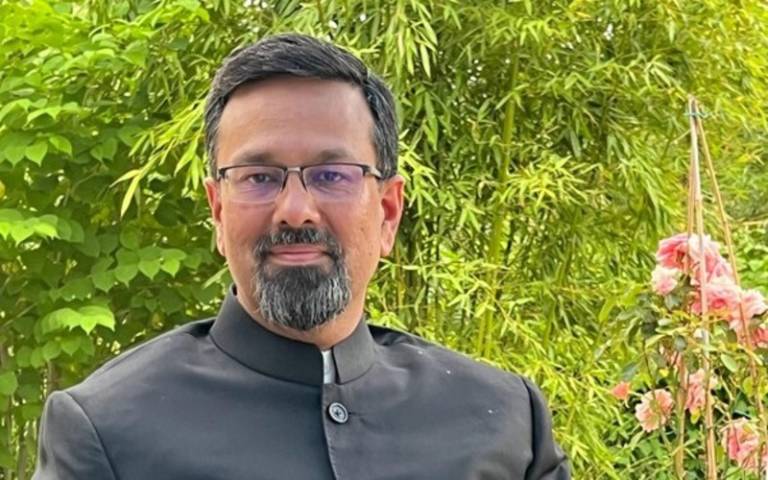Spotlight on... Kabir Sheikh
4 April 2024
This week we meet Kabir Sheikh, Professor of Global Health Systems and Policy at the UCL Global Business School for Health. Kabir discusses addressing the gap between scholarship and action when tackling health systems and shares his memories of foraging in the Himalayas.

What is your role and what does it involve?
My role at UCL is focused on advancing interdisciplinary learning to tackle health systems and policy challenges worldwide, and I lead research and teaching in this area. I also co-chair NIHR’s Global Health Policy and Systems Research funding committee.
There are many such persistent challenges, especially in low and middle-income countries – such as how to manage a mixed and pluralistic health workforce and make the most of that diversity, or how to design primary health care more effectively for urban and mobile populations. These questions take on new shades in the context of a rapidly commercializing health sector, climate change, wars and conflict, and the digital revolution.
We have some clues to the so-called “wicked” problems of health systems and how to tackle them, but there remains a big gap between scholarship and action. Scholarly knowledge that gets written up often doesn’t get used, which is tragic and wasteful. We need to reorient research and teaching on health systems to make it more relevant for real-world change. I am interested in listening and responding to the perspectives of people at the coalface - policymakers, managers, health care providers, and citizens. If we focus on answering their questions, we are more likely to create the sort of learning that gets used.
How long have you been at UCL and what was your previous role?
I joined UCL in August 2023. Before that, I spent 6 years at the World Health Organization in a role that involved conceptualizing, funding, and coordinating health policy and systems research in low and middle-income countries. I worked with scholars and policymakers in 40+ countries supporting them to do research on health systems and to use it effectively. I also focused on building learning systems – creating institutional capacities in countries to do and use health policy and systems research. Before that, I was Professor and Director of Research and Policy at the Public Health Foundation of India, Delhi, where I was based for ten years.
What working achievement or initiative are you most proud of?
Leading the membership organization Health Systems Global (HSG) first as Vice Chair and then Chair of its Board from 2014-18 – a time when it was still quite new – and helping take it to a position of stability and strength. Health policy and systems research was still a field on the margins at that time, and the work we did through HSG helped crystallise its identity, and made the world see why it was important. Several definitive frameworks and methodological texts were developed at that time, and the popular series of Global Symposia we ran helped create a community and a “home” for health systems researchers and practitioners across the world, especially those in LMICs.
Tell us about a project you are working on now which is top of your to-do list
We are working to develop a new Master’s in Global Health Systems and Policy, which I hope will help meet an important global need for more expertise in the area.
What is your favourite album, film and novel?
Album: I listen to a lot of film music and enjoy the work of Amit Trivedi and Sneha Khanwalkar. Old favourites include Blue by Joni Mitchell, Aja by Steely Dan, and all of Hugh Masekela’s albums.
Film: So many! Gangs of Wasseypur, Tokyo Story, Twin Peaks (yes, it’s a series not a movie), and lately - the Ghibli movies and Buster Keaton with my children. A film that affected me a lot in my 20s is Hiroshima Mon Amour by Alain Resnais.
Novel: I read a lot of non-fiction and Amitav Ghosh is an all-time favourite. Robert B Parker’s Spenser detective series is a fun diversion.
What is your favourite joke (pre-watershed)?
I have a black belt in dad jokes, and there is one about elephants in the fridge that is really terrible – it makes my children groan every time I tell it, which is about once a week.
Who would be your dream dinner guests?
Gayatri Spivak, James Baldwin – although I am imagining a walk instead of a sit-down dinner.
What advice would you give your younger self?
Focus even more on physical health and exercise. I never imagined how important that would become as I got older.
What would it surprise people to know about you?
I am trained as a classical vocalist (Hindustani).
What is your favourite place?
Dalhousie – a town in the Himalayas where I went for holidays with my grandparents as a child. We would go for forest walks and pick wild morels, edible fern, and strawberries and bring bagsful back home to eat. It was magical!
 Close
Close

